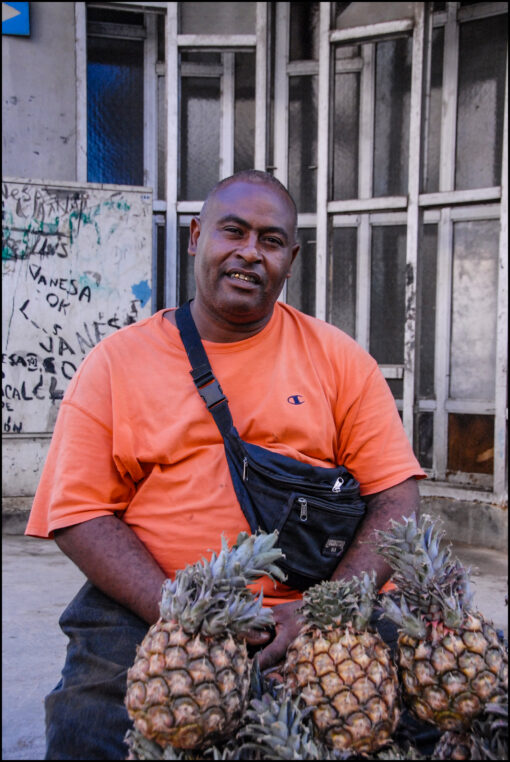The United States loves to brag that their get-tough approach to crime is for the protection of society. While in most cases this is true however, sometimes the penalty relative to the crime is grossly disproportionate and by association penalises broader members of society.
Lucien a pineapple seller is an example of when the penalty is greater than the crime.
I met Lucien on my last trip to Havana. I was walking in Old Town talking with my father when we came across a street vender selling pineapples and bananas from a homemade wheelbarrow. Our eyes contacted, I smiled at him and continued talking with my father.
Just as we walked by him this voice said with clarity, “It’s great to hear English again.” It was probably the last thing we expected to hear so we stopped and looked at this impoverished individual.

He asked us where we were from and I responded, “Canada.” My father asked him how he spoke flawless English, without accent.
He held out his hand to shake ours and introduced himself as Lucien. He then told us his incredible story of crime and unfair punishment.
Lucien and his brother were born in Cuba and lived there with his mother and father until he was five years old. At that time life in Cuba was hard, but it was made even harder with the collapse of the Soviet Union.
The new Russia could barely support itself with the fall of communism and with the subsequent demise of its empire, providing foreign aid to Cuba was quickly cut. The resulting cut had a drastic effect on the people of Cuba. Food shortages, fuel and other already scarce commodities became even scarcer. Lucien’s parents made the decision to escape to the United States and like many others ahead of them and behind them, paid money to a smuggler to get them to Florida. Lucien didn’t go into details of the trip because as he put it, “The memory of a five-year-old fades with time.”
Lucien’s family ultimately ended up in Chicago and Lucien grew up there, got married there and fathered a daughter there. Chicago is a tough town and it’s even tougher for immigrants, so Lucien took the easy route and turned to selling dope out of his house.
“Nothing more than dope,” he said. “I didn’t touch the hard stuff, didn’t want anything to do with that shit.”
A fate would have it, at 24 Lucien got busted for selling his product to an undercover cop. He was charged, found guilty and sentenced to five years in jail. During this time Lucien’s wife stayed faithful to him waiting for the day the three of them could be reunited.
Two weeks after his re-arrest, Lucien found himself alone back in Cuba. To him it was strange country. He knew no one, had no social network to fall on and because he was considered an escapee from Cuba, he had no claim to Cuban social programs or employment so selling pineapples from a wagon became his only option.
The unfairness of this punishment has left a broken a family. Lucien can never return to the United States and with the American government’s restrictions on Cuba, his wife and daughter cannot come to Cuba for a visit.
His biggest frustration is not being able to see his daughter grow up and not being there to support his family. He’s doesn’t make enough money selling pineapples to somehow send them and even if he were to obtain a job, the average Cuban only makes a bare subsistence wage.
Although marijuana is now considered a soft drug and, in some jurisdictions, has now been decriminalised Lucien will never have his record expunged because at the time of his arrest it was a crime. Nor as a non-citizen can he apply for a Presidential Pardon.

So, who knows if he’ll ever see his family again and as he explains, “This is what haunts me, never knowing my daughter, never watching her grow up, and never being there for her.”
Lucien and his family destroyed, an example of when American justice far exceeds the crime.
